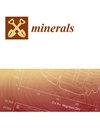中国东部古近纪毕阳凹陷盐渍化湖相富有机质页岩中硼的富集:发生与地质控制因素
IF 2.2
4区 地球科学
Q2 GEOCHEMISTRY & GEOPHYSICS
引用次数: 0
摘要
尽管硼(B)被广泛用作古湖泊的古盐度指标,但人们对盐渍化湖沼富含有机质页岩(SLORS)中硼富集的发生和地质控制却知之甚少。针对这一问题,本研究采用 XRD、XRF 和 ICP-MS 综合分析方法,比较了古近纪毕阳凹陷中高硼页岩(HBS)和低硼页岩(LBS)的矿物和元素组成。HBS 的矿物组成以伊利石为主,而 LBS 则主要由白云石组成,两者均为碎屑岩。硼与 Al2O3 呈正相关,与 Na2O 呈负相关,表明硼主要存在于伊利石中。在 HBS 沉积过程中,化学风化程度加剧,为盆地提供了更多的伊利石。在 HBS 沉积过程中,较高的 pH 值和较强的还原性促进了伊利石对硼的吸收,最终导致页岩中硼的富集。我们的研究结果表明,在应用硼和相关比率作为古盐度指标时,应充分考虑页岩的 pH 值和氧化还原条件以及矿物成分。本文章由计算机程序翻译,如有差异,请以英文原文为准。
Boron Enrichment in Salinized Lacustrine Organic-Rich Shale of the Paleogene Biyang Depression, East China: Occurrence and Geological Controlling Factors
Although boron (B) is widely applied as a paleosalinity indicator for ancient lakes, the occurrence and geological controls of B enrichment in salinized lacustrine organic-rich shale (SLORS) are poorly understood. This study addresses this issue by comparing the mineral and element compositions of high-boron shale (HBS) and low-boron shale (LBS) from the Paleogene Biyang Depression, using integrated XRD, XRF, and ICP-MS analyses. The mineral composition of HBS is dominated by illite, whereas LBS primarily consists of albite; both are of detrital origin. Compared to the element composition of UCC, HBS is extremely enriched in Mo and W, whereas LBS is extremely enriched in W and U. Boron is positively correlated with Al2O3 and negatively correlated with Na2O, suggesting that B primarily occurs in illite. An enhanced extent of chemical weathering prevailed during the deposition of HBS, providing a greater supply of illite to the basin. Higher pH levels and greater reduction during HBS deposition encouraged illite absorption of B, ultimately leading to B enrichment in shale. Our findings suggest that pH and redox conditions, as well as the mineral compositions of shale, should be fully considered during the application of B and related ratios as paleosalinity indicators.
求助全文
通过发布文献求助,成功后即可免费获取论文全文。
去求助
来源期刊

Minerals
MINERALOGY-MINING & MINERAL PROCESSING
CiteScore
4.10
自引率
20.00%
发文量
1351
审稿时长
19.04 days
期刊介绍:
Minerals (ISSN 2075-163X) is an international open access journal that covers the broad field of mineralogy, economic mineral resources, mineral exploration, innovative mining techniques and advances in mineral processing. It publishes reviews, regular research papers and short notes. Our aim is to encourage scientists to publish their experimental and theoretical results in as much detail as possible. There is no restriction on the length of the papers. The full experimental details must be provided so that the results can be reproduced.
 求助内容:
求助内容: 应助结果提醒方式:
应助结果提醒方式:


